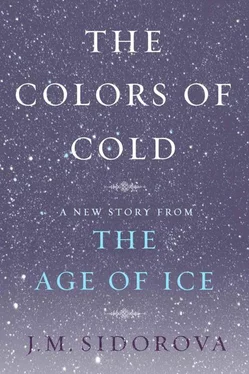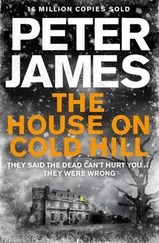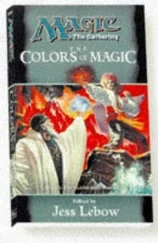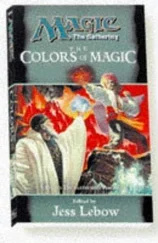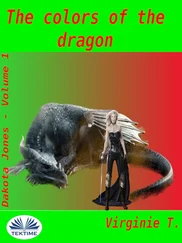I’ve never met that woman. She may have never existed. The one whose existence is certain was Avdotia Buzheninova, a jester by birthright and a humpback, whose act was to writhe in a mockery of yearning, to clutch her breast and wail that she was lusting for a husband. The empress loved the gag, they say—so much so that it inflamed her head with an idea of a jester wedding.
That winter was brutal, and generous with precipitation, thus permissive of all manner of arctic entertainment: making snowmen and leaving men out in the snow, sharpening blades of axes and ice skates, freezing little birds and little maids in flight. By January, upon the empress’s whimsical orders, a palace was erected out of ice blocks—the purest crystal blue, ripped out of the Neva River’s winter hide and chiseled to diamond perfection by the empress’s slave architects. Inside the palace was a wedding chamber, a canopy bed on a dais, with heavy drapes half drawn, cascading to the floor—all made of ice.
The wedding opened with festivals and masquerades. Dwarfs trumpeted and freaks paraded. A procession followed, and at its head strode the empress herself, dressed as the Queen of Sheba. She danced, quaking her regal fat, perspiring in her sleeveless gown. She led my parents to the wedding chamber, gave them the blessing, and locked them up for the night.
Idle tongues used to say it was for fear of being left forever inside the frosty chamber that my parents fulfilled their connubial duty. But what do they know of ice, those idle tongues? No one but an abused prince and his slave bride know how fingers, skin taut with cold, nail beds bruise-blue, climb into warm recesses of the flesh, hiding from frostbite. How sweat and tears freeze and join with ice, becoming part of the curtain, part of the bed. How flesh shivers, giving its seed up as the last drop of oil for the dying fire in a night that is as long as winter. How dawn glows through the walls of ice, and lights up the cavern, and finds them fused together, clinging to the residual warmth of each other’s blood.
Only in the morning did the guards go in, to find them half dead on the ice slab of their wedding bed. Nine months later, two boys were born. My brother Andrei came first, a perfect infant. I found my way out a day later. I was smaller and paler than Andrei, and once I cleared the womb, our poor mother expired. Everyone was certain that a colorless runt like me would not see his first summer. But they were wrong. They knew nothing of ice.
In Corpore Vili, or The Early Phenomena
1740–69
Empress Anna Ioannovna died a month after we were born, and my father retired from his clown duty and fled the capital for the family estate near Moscow. Peter the Great’s daughter, cheerful Elizaveta, eventually ascended to the throne, while Father married a proper, if unremarkable, noblewoman. Soon Andrei and I had a half sister and another sibling on the way.
The extended Velitzyn clan never let Father forget his ignominy, and the episode was a frequent punch line. Back then, no one was coddled. The age of delicate senses had not yet dawned, nerves had not been discovered. Father helped himself by letting his temper loose. The only concession he ever won was a ban on house jesters and fools, much lamented by the family members. We had to depend on our household pet for entertainment—a brown bear who sat on a chain by day and roamed the grounds as a watch by night, and who would dance for a treat when in the mood. Father was like that bear, I would think years later. Both fearsome, both wearing an indelible weak spot: one a chain-link in his nose; the other, a foolscap, once and forever.
My brother and I were treated to the story of our less than noble origins as soon as we were able to listen. I remember Andrei telling me (we were five or so), “If Anna Ioannovna didn’t die, you’d be a jester!” To which I replied, “We both would’ve been jesters. But if she hadn’t died we would’ve killed her!”
I uttered the murderous verb with the gusto only a child can get away with. Andrei returned a sharp glance. “To avenge our father? So that he would love us?”
It stunned me that this particular reason had been absent from my mind until Andrei brought it up. My reasoning, if you could call it that, went toward a takeover of the throne to found an empire of jesters, freaks, and cripples. I looked at my brother, at his serious face. Was there something important I did not yet understand? “Yes,” I said. “Why else?”
* * *
When we were eight, Andrei found a book somewhere in the house, titled La fantesca and written in Italian, which neither of us could read. On the cover was a drawing of a woman unloading a loaf of bread as round as her bosom in front of a man seated at a table. It was but a piece of smutty romance, as I later realized, but Andrei had connected it to the mysterious Catholic lady on whose account our father had been punished. His guess could have been correct—how else could an Italian tickler have wound up in the household of a Russian prince? Andrei, however, took to believing that the woman in the picture was our father’s love. And one day he confessed to me that this Italian woman was his true mother, not the jester Avdotia Buzheninova.
What enraged me wasn’t the fact that Andrei thought only of himself, not both of us, when he redefined his maternal origins. It was that he did not want to have sprung from the terrifying and wondrous Ice Wedding. That he could denounce it for the mundane womb of some foreigner wench with a loaf! Dimwit, I shouted at him. Humpback’s son, he shouted back. I hate you! — I hate you better! When nannies and wet nurses came upon us, we were balled up in a fight.
Clearly, though, I hated him less than he hated me. Not a week passed, and I was offering my humblest penitence to my brother. He pardoned me like a gracious king. He needed me to play the game of Czar-Sultan of the Golden Horde and the Great Warrior Ilya of Murom, or fence with oaken swords, or sneak upon the napping household bear, tickle his snout with a sallow-tree branch full of catkins, and run like we stole something when the beast awakened, sneezing.
* * *
When we were ten, we built an ice palace. It started as a snow fortress, then we added a wall slit for a window and a roof made of pilfered fire-wood and fir-tree paws overlaid with snow. The idea was mine. At first the interior of our palace was barely large enough to sit two, but we kept at it, carving and digging snow on the inside, hauling in and packing new snow onto the walls from the outside. When tired of our labors, we huddled inside. Andrei would make a tiny fire and gaze at it, his knees drawn up to his chin. I would wrap my arm around his shoulders. Even in those tender moments I couldn’t help but feel that I had failed to understand something important, that Andrei’s mind inhabited a different space, and, to squelch the feeling, I urged us back to work.
One sunny winter afternoon we were at work inside our palace when Andrei rose from his knees and walked out. I looked for him through the window: he stood just outside. He looked at our stepmother—pregnant again and bundled comfortably in furs, she promenaded down a path some fifty yards away. Our three-year-old half brother waddled next to her, his arm raised above his head, his little mitten of a hand held fast in hers. They stopped to look at our handiwork; she bent to talk to the three-year-old and pointed at us. Their shadows lay long and blue on the salt-white snow. I joined Andrei outside. Our stepmother started down the path again, away from us and our ice palace, slowly, so her child could keep up. Andrei stared after them. I tugged at his sleeve. “Let’s go!” He ignored me. I pulled again but he yanked his arm free.
Читать дальше
